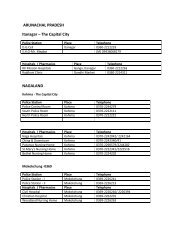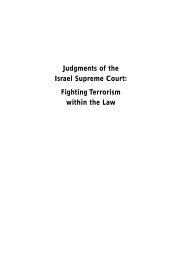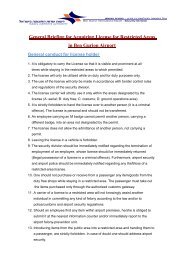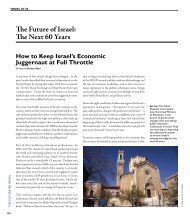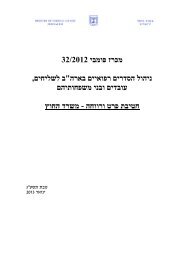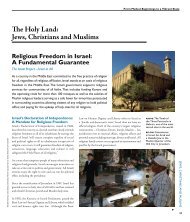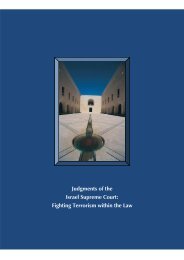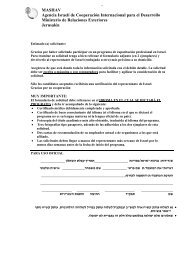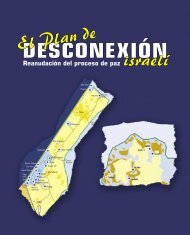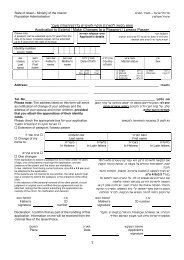Judgments of the Israel Supreme Court: Fighting Terrorism within ...
Judgments of the Israel Supreme Court: Fighting Terrorism within ...
Judgments of the Israel Supreme Court: Fighting Terrorism within ...
Create successful ePaper yourself
Turn your PDF publications into a flip-book with our unique Google optimized e-Paper software.
<strong>of</strong> <strong>the</strong> fence since his decision is founded upon political – and not military<br />
– considerations.<br />
27. We accept that <strong>the</strong> military commander cannot order <strong>the</strong> construction <strong>of</strong><br />
<strong>the</strong> separation fence if his reasons are political. The separation fence cannot be<br />
motivated by a desire to “annex” territories to <strong>the</strong> State <strong>of</strong> <strong>Israel</strong>. The purpose<br />
<strong>of</strong> <strong>the</strong> separation fence cannot be to draw a political border. In <strong>the</strong> Duikat<br />
case, this <strong>Court</strong> discussed whe<strong>the</strong>r it is possible to seize land in order to build<br />
a Jewish civilian town, when <strong>the</strong> purpose <strong>of</strong> <strong>the</strong> building <strong>of</strong> <strong>the</strong> town is not <strong>the</strong><br />
security and defense needs <strong>of</strong> <strong>the</strong> area (as it was in Ayoob), but ra<strong>the</strong>r based<br />
upon a Zionist perspective <strong>of</strong> settling <strong>the</strong> entire land <strong>of</strong> <strong>Israel</strong>. This question<br />
was answered by this <strong>Court</strong> in <strong>the</strong> negative. The Vice-President <strong>of</strong> this <strong>Court</strong>,<br />
Justice Landau, quoted <strong>the</strong> Prime Minister (<strong>the</strong> late Mr. Menachem Begin),<br />
regarding <strong>the</strong> right <strong>of</strong> <strong>the</strong> Jewish people to settle in Judea and Samaria. In his<br />
judgment, Justice Landau stated:<br />
The view regarding <strong>the</strong> right <strong>of</strong> <strong>the</strong> Jewish people, expressed in <strong>the</strong>se words, is<br />
built upon Zionist ideology. However, <strong>the</strong> question before this <strong>Court</strong> is whe<strong>the</strong>r this<br />
ideology justifies <strong>the</strong> taking <strong>of</strong> <strong>the</strong> property <strong>of</strong> <strong>the</strong> individual in an area under control<br />
<strong>of</strong> <strong>the</strong> military administration. The answer to that depends upon <strong>the</strong> interpretation<br />
<strong>of</strong> article 52 <strong>of</strong> <strong>the</strong> Hague Regulations. It is my opinion that <strong>the</strong> needs <strong>of</strong> <strong>the</strong> army<br />
mentioned in that article cannot include, by way <strong>of</strong> any reasonable interpretation,<br />
national security needs in broad meaning <strong>of</strong> <strong>the</strong> term.<br />
In <strong>the</strong> same spirit I wrote, in Jam’iyat Ascan, at 794, that<br />
The military commander is not permitted to take <strong>the</strong> national, economic, or social<br />
interests <strong>of</strong> his own country into account . . . even <strong>the</strong> needs <strong>of</strong> <strong>the</strong> army are <strong>the</strong><br />
army’s military needs and not <strong>the</strong> national security interest in <strong>the</strong> broad meaning <strong>of</strong><br />
<strong>the</strong> term.<br />
In Jam’iyat Ascan, we discussed whe<strong>the</strong>r <strong>the</strong> military commander is<br />
authorized to expand a road passing through <strong>the</strong> area. In this context I wrote,<br />
at 795:<br />
The military administration is not permitted to plan and execute a system <strong>of</strong> roads in<br />
an area held in belligerent occupation, if <strong>the</strong> objective is only to construct a “service<br />
road” for his own country. The planning and execution <strong>of</strong> a system <strong>of</strong> roads in an<br />
occupied territory can be done for military reasons . . . <strong>the</strong> planning and execution <strong>of</strong><br />
26



